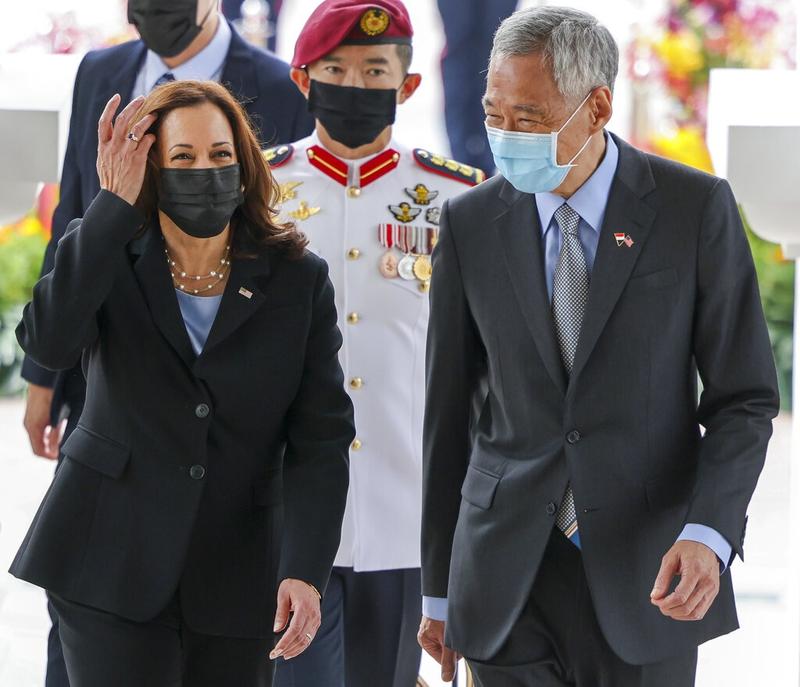 Kamala Harris, the US vice-president, is welcomed by Lee Hsien Loong, Singapore’s prime minister, at the presidential palace in Singapore on Aug 23. (EVELYN HOCKSTEIN / POOL PHOTO VIA AP)
Kamala Harris, the US vice-president, is welcomed by Lee Hsien Loong, Singapore’s prime minister, at the presidential palace in Singapore on Aug 23. (EVELYN HOCKSTEIN / POOL PHOTO VIA AP)
The visit of US Vice-President Kamala Harris to Singapore and Vietnam exemplifies a tone-deaf touch from the administration given the parallels with the superpower’s evacuations from Kabul and what was then Saigon.
On Aug 23, Harris met Singapore’s Prime Minister Lee Hsien Loong. In Hanoi, Harris met Vietnamese President Nguyen Xuan Phuc and Prime Minister Pham Minh Chinh.
She embraced a call to elevate the relationship with both countries. As Vietnam saw the first official visit by a sitting US vice-president, Harris was steering clear of Saigon comparisons to current Kabul evacuation. And on Aug 25 she was seeking to shift the focus from the historical parallels and emphasize Washington’s commitment to Southeast Asia.
Her arrival was delayed due to what US officials called an “anomalous health incident” in Hanoi, an apparent reference to the so-called Havana syndrome that has afflicted US diplomats in several countries.
It is not clear what causes the syndrome and it has led to unproven allegations that someone used sonic or other high-intensity electronic devices to physically harm US diplomats.
Harris’ visit came after a two-day stop in Singapore, where she took aim at China and sought to shore up US credibility in the wake of the Taliban’s stunning return to power.
But the Vietnam leg of the Asian tour has sparked criticism after the chaotic evacuation of Kabul prompted comparisons with the trauma of 1975 Saigon, when US helicopters in the last days of the Vietnam War ferried final evacuees from the embassy roof in the city now called Ho Chi Minh City.
China accused the United States on Aug 24 of hiding behind the rhetoric of a rules-based global order to defend its own bullying and hegemonic behavior, responding to remarks made by Harris that smeared Beijing over the South China Sea issue.
Foreign Ministry spokesman Wang Wenbin held up the US’ chaotic withdrawal from Afghanistan as an example of its “selfish” foreign policy, hitting back at Harris’ accusations of “intimidation” in Asian waters.
In a major foreign policy speech in Singapore on Aug 24, a day after she arrived, Harris accused China of threatening the sovereignty of Southeast Asian countries as she sought to reassure regional allies of the US’ commitment to the region.
In the speech, Harris laid out the US vision for the region built on human rights and a rules-based international order, and sought to solidify Washington’s pivot toward Asia.
Following the US vice-president’s remarks, Wang told a news conference in Beijing: “The current events in Afghanistan clearly tell us what the rules and order the US speaks of are. The US can wantonly conduct military intervention in a sovereign country and does not need to be responsible for the suffering of the people in that country.
“In order to defend ‘America first’, the US can arbitrarily smear, suppress, coerce and bully other countries without paying any price. This is the order the US wants … but who will believe them now?”
Wang said that China has always believed that exchanges between countries should be conducive to promoting trust among nations and facilitating peace and stability in the region and in the world.
On Aug 23, Singapore’s Prime Minister Lee hosted Harris for talks that addressed climate change, the pandemic and cybersecurity.
Rajiv Biswas, Asia-Pacific chief economist at global research and information provider IHS Markit, said the climate partnership between Singapore and the US aims to promote sustainable financing and to mobilize private capital in the fight against global warming.
Lawrence Loh, director of the Centre for Governance and Sustainability of the National University of Singapore’s Business School, said supply chain resilience is a “significant concern” in the US’ relationship with Singapore and other member states of the Association of Southeast Asian Nations.
Harris is the latest top official from US President Joe Biden’s team to visit the region as Washington seeks to reassure allies of its steadfastness.
But events in Kabul have cast doubts on US claims of reliability.
Pham Quang Vinh, Vietnam’s former ambassador to the US, told Agence France-Presse that his country was watching events in Kabul closely. “The US has recommitted itself now to this region but if something happens in Afghanistan again, for example if terrorism comes back, ... will the US continue to focus here?” he said.
The US-China relationship has deteriorated over a range of issues from cybersecurity and trade conflict to human rights.
Vietnam has sought to forge its own path between the two leading countries. On Aug 24, the Vietnamese prime minister met the Chinese ambassador and stressed that Hanoi would not “align with one country against another”.
Prime Sarmiento in Hong Kong, Zhou Jin in Beijing and agencies contributed to this story.


